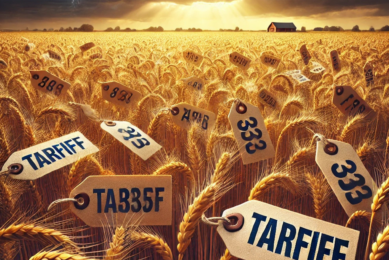Ukraine food and grain exports gain steam

With the Black Sea grain corridor fully functioning, Ukraine’s grain exports are reaching 7 million tonnes per month, Leonid Kozachenko, president of the Ukrainian Agrarian Confederation, recently unveiled.
Roughly 80-85% of exports go through the Black Sea grain corridor, which resumed operations this year, Kozachenko indicated. For several months after Russia departed from the UN-brokered Grain Deal in July 2023, Ukraine primarily relied on the Danube Logistics Route for exporting its agricultural commodities. In 2024, Ukraine started transporting more grain through the Black Sea despite looming security concerns about this route.
Kozachenko noted that the initiative has largely contributed to export growth in the first half of 2024.
“Of course, it should be added that the Danube Logistics Route has never transported products in such volumes. It is in second place after the Black Sea Grain Corridor. Third place is rail and road transport. Therefore, the total volume of exports in some months even exceeds what we had on average for the previous year,” Kozachenko said.
However, he estimated that since the start of the hostilities, logistics costs associated with grain exports have spiked by nearly 350%.
During the first half of 2024, Ukraine exported food worth US$12.4 billion, the government estimated. In 2023, food exports amounted to US$22 billion.
Lower production
However, in the coming months, exports could decline because Ukrainian farmers will have fewer commodities to sell on the global market.
The US Department of Agriculture expects Ukrainian wheat exports to total 13 million tonnes in the 2024/2025 marketing year, which is the lowest level in 10 years. Analysts expect Ukraine to harvest 19.5 million tonnes of wheat, which is 3.5 million tonnes down compared with the previous year.
This year, Ukraine’s harvest of all agricultural commodities could be lower, and hostilities are not the only factor to blame. A heatwave that affected several Eastern European countries could potentially cause Ukraine to lose up to 30% of its corn harvest in 2023 – a concerning prospect for the industry.
Difficult weather conditions could hurt the future harvest of Ukrainian corn and sunflower, the Ukrainian Agri Council recently warned. It is possible to repeat 2020 when the harvest of these crops decreased by 35% due to drought.
“Productive moisture reserves are extremely low. Despite the fact that the temperature is expected to drop, the lack of precipitation will negatively affect the development of these crops. Nowadays, in particular, corn is beginning to bloom, laying the foundation for yields. And without precipitation, the situation could be quite critical,” the organisation warned.











